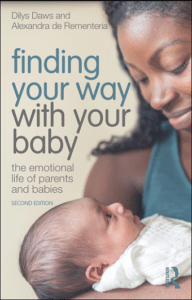26th November 2021
A book review by Hilda Beauchamp, Perinatal & Infant Mental Health Lead, iHV

Finding your way with your baby: the emotional life of parents and babies (Routledge)
Authors: Dilys Daws (Honorary Consultant Child Psychotherapist, Tavistock & Portman NHS Foundation Trust) and Alexandra de Rementeria (Lead Therapist, Tavistock Outreach in Schools Project, Course Tutor on Masters in Psychoanalytic Observational Studies, Tavistock, London, Editor-in-Chief, Journal of Child Psychotherapy)
Dedicated to health visitors, the ‘emotional safety net for all parents and babies’, Dilys Daws and Alexandra de Rementeria’s newly updated book is a must-read. Finding your way with your baby: the emotional life of parents and babies is not your usual baby book full of snappy sound bytes and top tips for busy mums and dads, but is a considered, respectful and balanced guide for parents as they discover the new world of feelings encountered during their baby’s first year. It is an invitation to parents to reflect on their own babies, their own emotions and find their own solutions.
The authors’ combined wisdom, curated from decades of clinical practice, academic research and personal parenting experience, brings a refreshingly honest perspective to both the joy and despair experienced by parents in the early months. A candid unpicking of what amounts to ‘good enough parenting’ and an acknowledgement that ambivalence and jealousy are commonly felt by new parents gives the reader permission to sit with the discomfort of ‘not-knowing’, bearing uncertainty, conflicts and inconsistency, in order to learn from the baby. The text is thoughtfully punctuated with vignettes from parents, summaries from clinical casework and adroit illustrations from Ros Aquith. It includes excerpts from the latest research in neuroscience, psychoanalysis and infant observation, drawing particular attention to the concept of ‘matrescence’, a restructuring of the maternal brain during the transition to parenthood, akin to that of adolescence, that offers insight into the mismatch of experience and expectations identified by many mothers.
The book places careful emphasis throughout on the individual needs, temperament and preferences of each baby, giving clear explanations for why difficulties might be experienced. We support the advice that, when parents are unsure about national guidance and how this might apply to their own baby, they should consult with their health professional. This is particularly important for topics like the introduction of solid food and safer sleep practices which many parents find confusing but can also have serious implications on child health and wellbeing if misinterpreted.
Although written for parents, it is a rare gem of a reference for health visitors, who will welcome the steer away from a medical model and embrace the encouragement to do what they do best – walk alongside, remain curious, wonder ‘with’, and support parents to reflect on their feelings associated with infant caregiving and interactions – in short, ‘relationships’! Adopting an ‘infant mental health’ perspective on the common regulatory problems associated with infant feeding, sleeping or crying may help a parent to understand how problems may have arisen, and gain confidence in how to address them. Daws and de Rementeria reflect that this can be a painful process, postulating the notion that feelings of ambivalence or hostility towards the baby may be the result of disturbing experiences in the parent’s own childhood, but one that can be made bearable by the thoughtful mind of ‘another’, often the health visitor. Simply talking about these difficult events, and being heard, can be enough to enable parents to recognise the connection and feel released, and there is gentle encouragement to parents throughout the text to reach out to health professionals who ‘have a deep interest in the welfare of babies and their parents’.
Dilys Daws is a particular advocate of health visitors, writing,
“I worked for 45 years, half-a-day weekly, at the Baby Clinic of the James Wigg Practice. I helped parents solve problems with their infants, and also consulted to the Health visitors and GPs, assisting them in identifying the emotional part of the problems and managing their own stress in dealing with the distress of the parents. The first paper I wrote on this was called ‘Standing by the Weighing Scales’, a title which has been much quoted! This means that I have been standing in the working space of Health Visitors, trying not to get in their way! and I am very pleased that I have been so much welcomed there. As well as helping them not to rush to give advice, and to reflect on problems, they have also helped me to learn more about the complexity of different relationships between parents and babies, both normal and disturbed. It has been a very enjoyable part of my life!”
With a generous discount of 20% (see attached flyer), this warm, compassionate and reassuring book would make a wonderful Christmas gift for any new parent, grandparent or colleague.






